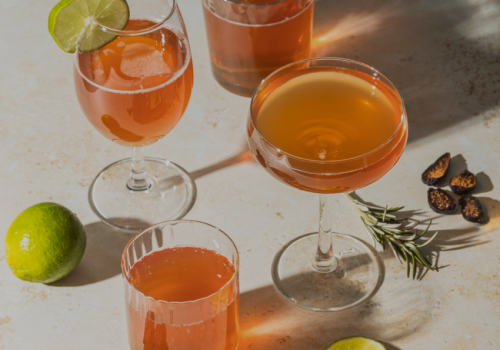CAN HEMP PLASTIC AND PLANT-BASED PLASTIC ALTERNATIVES SAVE THE PLANET?
PUT YOUR HANDS IN THE AIR FOR THE WONDERFUL VERSATILITY OF HEMP
Remember a time before plastic? Unless you are pretty ancient, the answer to that one is a big no. But we’ve only been plastic addicts for around one hundred years. The whole expanse of history before that, we were plastic-free.
So, what’s the big deal? Aside from the inescapable images of plastics in our oceans (once they’re in your head, there’s no getting rid of them), plastics are a boon. It’s inexpensive to make, convenient to use, and forms a nice sanitary casing for thousands of products we rely on every single day. Think food packaging, personal care products, and everything in between, You can’t move for the plastic that’s surrounding us.
Microplastics, Our Health, and the Environment
While society continues to rely heavily on plastic, the far-reaching implications on our environment and our health are wreaking havoc. When we say our health, we’re of course talking about microplastics. In a world filled with plastic, we end up eating, drinking, and breathing these microscopic pieces of the stuff daily, and while that alone doesn’t sound great, these small plastic particles also contain chemical additives that have been associated with serious health problems like infertility, hormone-related cancers, and neurodevelopment disorders.
So how does this happen? Once plastics and microplastics end up in the environment, which they do as they fester and slowly break down into little pieces (note, plastic never biodegrades completely) in landfills and so on, they attract micro-organisms like harmful bacteria. If microplastics containing these pathogens enter our bodies, they can increase the risk of infection.
So, there are serious implications for our health. And it doesn’t end there because the environmental impact of plastics is just as devastating. National Geographic predicts that plastic trash in the ocean will nearly triple by 2040 to 29 million metric tons. Among its many nasty impacts, these plastics destroy marine ecosystems and wheedle their way into our own food supply.
To understand what the heck hemp plastic is, it’s worth getting to know your standard plastic versions first. From a science-POV, plastics are made from long chains of molecules that are linked together. These chains are referred to as polymers and they repeat the same structure on repeat, and this is what makes them so uniquely moldable and convenient for a variety of uses. You can see why manufacturers love them, right?
But here’s the downer – most plastics are created from polymers that are found in petroleum, which is not the most eco-friendly thing FYI. However, petroleum isn’t the only substance out there that naturally contains polymers. Cue the alternatives we’re already raving about! Hemp and many other plants contain a type of polymer called cellulose which can, in turn, be produced into plastic. These plant-based plastics are also commonly referred to as bioplastics.
In terms of winning qualities, hemp contains an abundant amount of cellulose, making it an ideal, sustainable option for producing bioplastics. Companies like Cannopy Corporation which specialize in hemp plastics and other industrial hemp products are blazing trails with these fascinating alternatives.
If you check out Cannopy Corporation, they tell us, “Hemp is the greatest cellulose producer on Earth,” and it contains up to 85% cellulose (meaning, nice and moldable, get it?). So, ready to look here at some of the benefits that hemp plastic has to offer? Let’s see it versus conventional plastics:
- Hemp plastic is biodegradable: Remember plastic can take decades to fully decompose (and more!) and it needs the right conditions to do that. Hemp plastic along with other bioplastics decomposes within a comparatively minuscule three to six months, which is a whole lot better alternative for single-use purpose plastics.
- Non-toxic option: Conventional plastic contains chemicals that are endocrine disruptors. The hormonal imbalance caused by these endocrine disruptors has been linked to various, serious health concerns like birth defects and learning disabilities for starters. While these toxic chemicals directly impact our bodies, they can also leach into the soil and groundwater, further devastating the environment and our health. In comparison, bioplastics don’t contain harmful endocrine disrupters like petroleum-based plastics.
- No fossil fuels required for production: Already sounds good, right? Yep, the process of creating hemp plastic doesn’t require fossil fuels. Fossil fuel production has its own implications when it comes to damaging the environment. With hemp plastic and bioplastics, you no longer need the monomers provided by fossil fuels to achieve effective plastic production. Note that plastic is a big contributor to rising CO2 emissions too, so bioplastics could help decrease environmental pollutants which is big and good news. Plus, hemp can reduce the greenhouse effect by absorbing carbon dioxide from the atmosphere.
- More sustainable than other bioplastics: While we’re flying the flag for bioplastics, know that plant options like wood and cotton are also used for creating plastic. That said, hemp provides a more sustainable option when it comes to water consumption and farming practices. When compared to cotton, hemp requires approximately 50% less water. Hemp is also naturally pest-resistant and helps prevent soil erosion, making organic farming practices more achievable. So, this way we have less pesticide-filled water runoff and water pollution.
- More durable than petroleum-based plastics: Oh yes, it’s eco and it’s strong! Hemp plastics are five times stiffer and three and a half times stronger than polypropylene, one of the most common types of petroleum-based plastics. Hemp plastic is also a lot lighter, so it’s a stronger, more lightweight option. What’s not to love?
If you’re wondering how practical hemp plastic is, it’s a fact that thousands of everyday plastic products could effectively be replaced by hemp plastic and other bioplastics. A master of versatility, hemp plastic can be molded into virtually any shape. Now that’s a great alternative for a variety of products, running from:
- Cosmetics
- Containers
- Bottles
- Bags
- Toys
- Furniture
- Car parts
- Electronics
- Boats
- The list goes on, seriously.
Interestingly, as we speak several car manufacturers are using hemp composites for door panels and other parts. Want some examples? Ok, so parts of the Porsche 718 Cayman GT4 Clubsport are made from natural fibers like hemp and flax. Another popular use for hemp plastic is packaging materials.
In other news, The Hemp Plastic Company uses hemp waste from other hemp industries like CBD (which we love!) to create hemp-based polymers which can be manufactured into almost any type of plastic product. This smart company produces hemp-based pellets for producing everything from jars to cosmetic packaging.
Other Bioplastic Alternatives
Ok, hands up, we might be slightly biased towards hemp, but you’ve got to admit, how many incredible benefits does hemp plastic have to offer? But being neutral here, there are more and more bioplastic options proving worthy alternatives to conventional plastics, and they deserve a namecheck. Here’s a quick lineup of some other sustainable bioplastic alternatives:
Did we say mushrooms? Oh yes because mushrooms can be turned into resilient, biodegradable bioplastic with zero toxic byproducts. The water-resistant biomaterial is being used for a variety of applications ranging from fine mycelium leather substitutes for clothing and footwear to packaging material needs. Mind blown?
Sounds less than yummy, but on a practical level algae and fish waste-based plastics are a great alternative to single-use plastic. Companies like Algix are digging deep into multi-purpose solutions for addressing harmful algae blooms that can impact both the environment and create biotoxins susceptible to certain individuals. At the same time, they’re creating biomass that can be converted into a bioplastic material. A UK startup called MarinaTex is also using fish skin and scales bound with red algae to make compostable plastic alternatives.
Another supercharged byproduct, the husks of sunflower seeds used for oil production are generally considered waste but brainiacs are transforming them into bioplastics. The biodegradable option requires no synthetic binder or toxic varnish – the remains after the oil has been extracted are turned into a water-based glue and heat-pressed into a thin, flexible film that resembles leather.
How does this work? Well, olive pits or seeds are rich in an active ingredient called oleuropein. This antioxidant can help extend the life of the bioplastic while also speeding up the composting process for bioplastics into fertilizer within a year. Using this olive oil waste gives us another alternative to even the eco-friendlier corn-based bioplastics that still need binders making them *not* the most sustainable to produce.
Become a Part of the Solution
Feeling the need to act? We know we are. We mean, while supporting hemp plastic and other bioplastics is a great way to help address the world’s growing plastic problem, there are other ways to make a difference on a personal level. For starters, think about purchasing reusable items when it comes to things in your home or office and seek out brands that are taking initiatives to minimize their single-use plastics. There’s a growing number of those to choose from, and it makes for happy research.
Over in Press Pause HQ, we remain committed to finding sustainable alternatives for doing our part to help minimize this serious health and environmental concern. This includes minimal single-use plastics, recycled-material packaging, and glass containers. We are always looking for better ways to reduce our carbon footprint.
We also know this isn’t a closed conversation, and we welcome any feedback or suggestions you may have on our ever-evolving journey to better sustainability. Shop our sustainable CBD products or contact us to get involved in our mission to cut down our environmental impact. We’re in this together!







